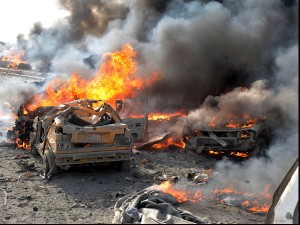UN Human Rights Council extends mandate of its Syria probe
GENEVA—The UN Human Rights Council on Friday voted overwhelmingly to extend the mandate of its probe into rights violations in Syria, condemning the “increasing number of massacres” in the country.
Of the council’s 47 members, 41 voted in favor of the resolution allowing the Commission of Inquiry to continue its investigation, which began a year ago.
The three member states that have most resisted international intervention in Syria — Russia, China and Cuba — voted against the resolution.
India, Uganda and the Philippines abstained.
The resolution also called for UN chief Ban Ki-moon to provide the commission with additional resources, including staffing, so it can “fulfil completely its mandate in the light of the increasingly deteriorating situation of human rights” in Syria.
Article continues after this advertisementIt also “condemns in the strongest terms the increasing number of massacres taking place in the Syrian Arab Republic, and requests the Commission of Inquiry to investigate all massacres.”
Article continues after this advertisementThe US representative at the council, Eileen Chamberlain Donahoe, stressed her country’s support for the resolution.
“The work of the Commission of Inquiry is important,” she told the council, pointing out that the UN investigators’ work would “help ensure that this will not be a case where impunity prevails.”
The Commission of Inquiry on Syria, headed by Brazilian Paulo Sergio Pinheiro, was created a year ago, and if the new resolution, drawn up by seven Arab states, had not been approved, its mandate would have expired Friday.
In its latest report published last month the commission accused the Syrian regime and to a lesser extent rebel forces of committing war crimes and crimes against humanity.
Its conclusions were based on more than 1,000 interviews with perpetrators and victims in the conflict, as investigators have so far been blocked from entering Syria to see the situation on the ground.
The resolution, submitted by Jordan, Kuwait, Libya, Morocco, Qatar, Saudi Arabia and Tunisia, expressed strong condemnation of all the violence in Syria “irrespective of where it comes from, including terrorist acts.”
Before the vote, Russia’s representative Maria Khodynskaya-Golenischva, said the member states this time had “almost found a compromise,” pointing out that the current resolution was “more balanced” than previous ones by also condemning “terrorism.”
But Russia, she said, could not accept some of the conclusions, including those attributing the Houla massacre to regime forces and members of the Shabbiha militia, and therefore voted against the resolution.
Faysal Khabbaz Hamoui, the representative for Syria, which is not a member of the Human Rights Council, meanwhile blasted the resolution, insisting it did not “reflect reality in Syria.”
He also criticised the seven Arab countries that drafted the resolution, saying “they have not shame…. They are boldly presenting this as though they lived in a real oasis of democracy.”
